Report Card
December 2020
www.arsba.org

The Journal of The arkansas school Boards associaTion

December 2020
www.arsba.org

The Journal of The arkansas school Boards associaTion
Governmental Relations Director Dan Jordan and other ASBA staff members are optimistic about the 2021 legislative session after House and Senate Education Committees recommended 2.33% annual increases in foundation funding, the largest in many years. Legislators supported the extra funding knowing schools have faced extra expenses this year. Meanwhile, legislators, ASBA staffers and others are preparing to do business in the middle of a pandemic that will require masks, social distancing, and a lot of flexibility.
Across Arkansas, they’re doing more than ever, so what can school board members do for them in return?
How did schools continue to educate half a million Arkansas students during a pandemic, when some students have been in the classroom, some have been educated virtually, and some have been sent home because of an outbreak? Thank our teachers.
Across Arkansas, teachers have done twice the work they usually do. I’m glad this issue features the Arkansas Teacher of the Year, Susanna Post from Fort Smith, but she’s really just a representative of all the state’s incredible educators. We can’t name everyone Teacher of the Year, so instead we just name one.
There’s no way policymakers could ever thank our teachers enough, but there are several ways we as board members can let them know we appreciate them.
First, we should make our classrooms safe. We should not live in fear of viruses, but we can reduce risk. In recent years, school districts have invested in security measures to protect against acts of terrorism and violence. School board members should likewise learn about ventilation and other measures that can reduce disease transmission. Mean-

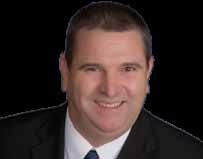
by Randy Goodnight ASBA President
while, school boards should be sure their district’s policies don’t pressure teachers and students to come to school when they’re sick.
Second, we should prepare now for the changes our patrons will demand after the pandemic ends. Some families have learned they prefer an online or blended option. Public schools will have to provide these because if they don’t, someone else will.
However, we cannot continue to ask teachers to be both in-person and online educators. Schools will have to create systems and processes that allow these services to live on.
Teachers have gone far above and beyond the call of duty in 2020. Moving forward, we must ensure their workloads are reasonable. We’ve asked a lot of them this year, and they’ve delivered.
But we can’t ask them to work two jobs for one salary.
And that brings me to the third way school board members can support teachers. We all wish we could pay teachers more while balancing our budgets. Thankfully, we can do both.
The House and Senate Education Committees have approved an adequacy report that recommends an additional $15 million each fiscal year to help school districts pay for increasing teacher salaries.
The additional money would help address a concern created in 2019 when lawmakers increased minimum teacher salaries to $36,000 by 2023 but didn’t help fund the increases after that.
As school board members, we should contact our legislators and encourage them to fully fund the raises permanently. That’s a win-win for teachers and for school districts. Otherwise, some districts may have to look at staff reductions after 2023.
Teachers are on the front lines, while school board members are just in charge of supplying the ammo. We need to do our part to ensure teachers have what they need to fight this battle: safe classrooms, reasonable workloads, and fully funded salaries.
It’s the least we can do now that they are doing more than ever before.
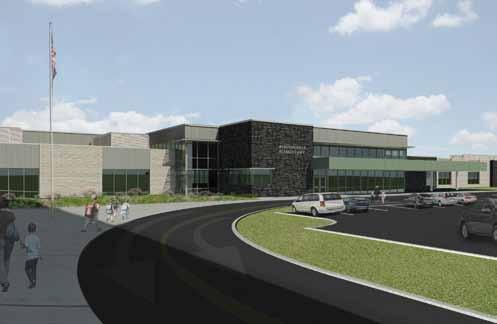

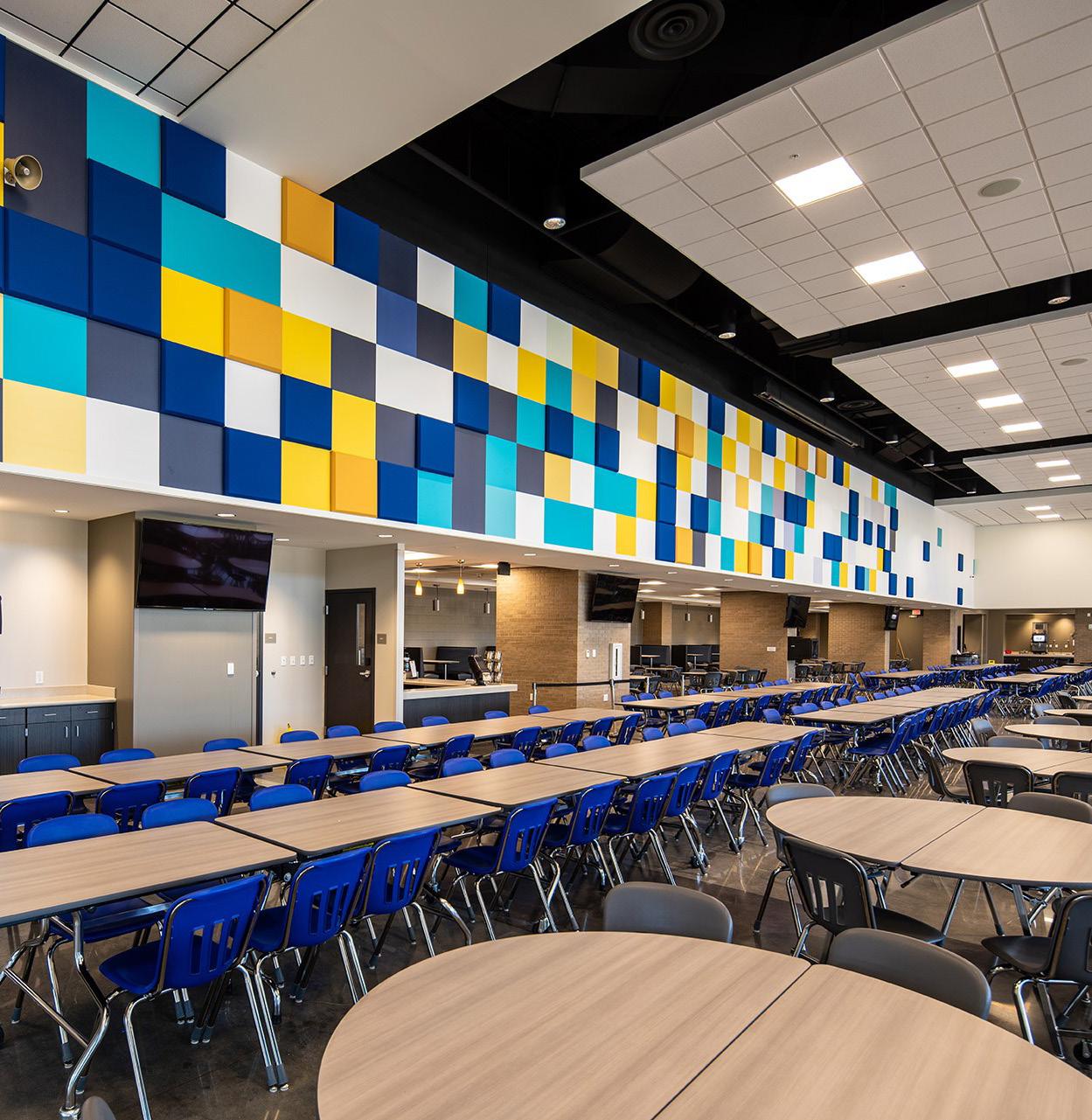


Sheridan School District Superintendent

Partnering with Chartwells has been a great business decision. Five years ago we ran our foodservice program in-house and we were significantly in the red. Today, we are significantly in the black. There have been many benefits besides financial that make this a win for Sheridan School District.
• More students eating - over 25% increase in lunch and 19% in breakfast since we started, and continued growth year over year
• Environment has a collegiate, inviting feel
• Implemented School Garden to Table program
• Coffee shop serves reimbursable meals, froyo and a la carte items that students love
• Students have a place where they can eat, connect with others, recharge, and enjoy a sense of happiness in their school
• Fresh, made-from-scratch food and tons of daily options that students and staff enjoy

Contact me and let’s start planning your dream foodservice program!
Kellye Neal 501-615-3660 kellye.neal@compass-usa.com


• Internal and external catering
• Adult participation increased by 31%
• Concessions has become a food destination for the community each week
• Our District Food Service staff now has the tools, resources and training to be successful
Sheridan Schools and Chartwells, a partnership that serves the students

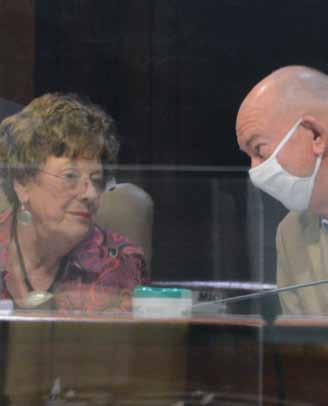
House Education Committee Chair Bruce Cozart, R-Hot Springs, confers with outgoing Senate Education Committee Chair Jane English, R-North Little Rock, during a recent joint meeting to discuss educational adequacy. Lawmakers and lobbyists, including ASBA’s staff members, are preparing for a legislative session unlike any other, where they’ll try to pass laws in the middle of a pandemic. The good news: They’ve already recommended more money for schools.
Dr. Judy Hubbell quotes the African proverb, “It takes a village to raise a child,” knowing her patrons in Fordyce live by that concept. She said her community’s businesses, churches and individuals rally around the district.
The 2021 Arkansas Teacher of the Year says empathy is the key to reaching students. Susanna Post, who teaches at the Fort Smith School District’s Belle Point Alternative Center, learned of her award the same way past Teachers of the Year have learned of theirs – by surprise.
Board members can be a “valuable force multiplier” during the COVID-19 pandemic by working together as a team using best practices, said Dr. Anne Butcher, ASBA board development director, during the Region 1 annual meeting.
Lawmakers prepare to return to Little Rock in January after proposing the largest funding increase for schools in years. What else happens – and how it all will look during a pandemic – remains to be seen.


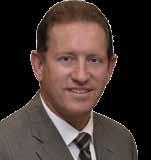
by Dr. Tony Prothro
I have been a party to conversations over the last several months with educators and board members on the topic of school finance. Many changes experienced during the pandemic will affect school districts’ revenues and expenditures. Here are a few of the topics that have surfaced:
• School Lunches – Many are worried about the future of free and reduced lunch meal reimbursement. Schools were granted the opportunity this year to provide all students free meals and be reimbursed at the free rate. Many are concerned about next year and the free/reduced lunch application process. It will have been two years since families were required to submit the forms to be eligible to receive free/ reduced meals, and there is a concern it will be difficult to get families to return future applications. Another worry is that families who are not eligible for free lunches will have become accustomed to not paying, and subsequently unpaid lunch charges may skyrocket next year in many schools.
• Property Taxes – Property taxes are a main source of revenue for school districts. These funds are used to pay bond payments for school buildings, technology, and some operational expenses. Boards will need to closely monitor current year tax collections in relation to previous years.
• Foundation Funding – Many schools have fewer students on their membership rolls than in past years due to current year homeschooling and other venues where students are not being counted. Foundation funding is a main revenue source for schools and is distributed based on the number of students enrolled in schools the previous year. It’s possible that some schools may not have as much foundation aid next year as they did this year.
• Minimum Teacher Salary Schedule – Some districts have expressed
concern that the initial $60 million that was allocated over a four-year period to meet the new minimum salary schedule will not be enough in the next biennium, and some schools will be deeply financially impacted.
While all of these and other concerns have been voiced over the last several months, the Legislature has stepped up to the plate to meet some of the needs. The Adequacy Committee approved recommendations on October 6 to be considered by the General Assembly in the 2021 legislative session. Here are some highlights:
• Foundation Funding – The committee recommended a 2.33% increase in foundation funding for each year of the biennium. This is the largest percentage increase recommendation in more than a decade.
• Enhanced Teacher Salary Categorical – The committee added a new categorical line item to assist districts in meeting the minimum teacher salary act. A recommendation of $15 million for each year of the biennium is allocated within this new funding. The distribution of the funds to districts based on need is yet to be determined.
• Categorical Item Funding –Across-the-board increases in many of the categorical funding categories is being recommended.
Now is the time to reach out to elected officials to educate them on the particular needs of your school districts. More information and data will become available in the upcoming months that will need to be shared with your local legislators. While the future of school finance will always be a top priority for those involved in K-12 education, the recent acts of the Adequacy Committee greatly lessen the anxiety of many education stakeholders. This is an opportune time to thank your legislators for making recommendations to hopefully meet the needs of your students.
The Journal of The arkansas school Boards associaTion
Vol. 13, Number 4 December 2020
P.O. Box 165460 / Little Rock, AR 72216
Telephone: 501-372-1415 / 800-482-1212
Fax: 501-375-2454
E-mail: arsba@arsba.org / www.arsba.org
President: Randy Goodnight, Greenbrier
President-elect: Rosa Bowman, Ashdown
Vice President: Dr. Tad Margolis, Valley View
Sec.-Treasurer: William Campbell, McGehee
Past President: Neal Pendergrass, Mtn. Home
Region 1: Randy Hutchinson, Springdale
Region 2: Randy Rogers, Lead Hill
Region 3: Dr. Julea Garner, Highland
Region 4: Kyle Cannon, Mena
Region 5: Clint Hull, Pottsville
Region 6: Nikki King, Pangburn
Region 7: D’James Rogers, West Memphis
Region 8: Jereme Carter, Carlisle
Region 9: Joey Astin, Forrest City
Region 10: Mark Curry, Lake Hamilton
Region 11: Carl “Buddy” Puckett, Poyen
Region 12: Laura Clark, Blevins
Region 13: Doris Parham, Bearden
Region 14: Jerry Daniels, Warren
Staff
Executive Director: Dr. Tony Prothro
Board Development Director: Dr. Anne Butcher
Governmental Relations Director: Dan Jordan
Finance Director: Diana Woodward
Communications and Technology Director: Sherri Fite
Staff Attorney: Kristen Garner
Policy Director: Lucas Harder
Database Administrator: Kathy Ivy
Commercial Affiliates/Board Liaison Manager: Angela Ellis
TIPS-TAPS Project Manager: Mickey McFatridge
General Counsel: Jay Bequette
Risk Management Program & Workers’ Comp. Program: Shannon Moore, Director
Krista Glover
Dwayne McAnally
Misty Thompson
Amanda Blair
Melody Tipton
Tiffany Malone
LaVerne Witherspoon
Linda Collins
Lisa Wigginton
Kara Quinton
TO CONTACT THE MAGAZINE
Please contact Steve Brawner, Editor
501.847.7743; brawnersteve@mac.com
Report Card is published quarterly by the Arkansas School Boards Association. Copyright 2020 by the Arkansas School Boards Association and Steve Brawner Communications. All rights reserved.
Four new directors were elected during ASBA’s fall regional meetings this year, while one director was re-elected to another term.


Jereme Carter of Humnoke, a member of the Carlisle School Board, was elected as director of Region 8. Carter was first appointed to the school board in 2015 and then elected in 2016. He is the parent of a sixth grader, and two of his children and a niece he and his wife raised have graduated from Carlisle. He farms corn, rice and soybeans on a 4,600-acre family farm started by his grandfather in 1962.
Carl “Buddy” Puckett with the Poyen School Board was elected to serve as Re-
gion 11 director. Puckett became a school board member in 2009 and serves as secretary after previously serving as president and vice president. Puckett graduated from Poyen High School in 1990. He and his wife, Kim, also a Poyen graduate, have raised two daughters who graduated from Poyen and one son who still attends school there. He works for McLarty Collision North in Sherwood. Laura Clark of Blevins was elected to serve as Region 12 director. Clark joined the board in 2010 and serves as president after having previously served as secretary. She graduated from Blevins in 1985. Her children graduated from Blevins High, and her husband taught and retired from Blevins as a schoolteacher. She is interim chancellor of the University of Arkansas Community

College Hope-Texarkana and is vice chancellor for academics. She is a former nursing educator there.

• School board legal liability insurance
• Employment practices liability insurance
• Outside of Arkansas General Liability coverage
• Distinctive and identifiable coverage grants
• Modified “defense outside of the limits” provision
• Separate crisis management fund
• Employment law resources through Enquiron
• Online resource website
• Panel defense counsel
• Dedicated claim representative For a quote comparison or coverage consultation, contact:
Doris Parham with the Bearden School District was elected as Region 13 director. Parham has been a school board member for 25 years and is currently board president after serving more than 10 years as secretary. She has two children who graduated from the district. She has been employed 24 years as a production and scheduling specialist with General Dynamics Ordnance and Tactical Systems in East Camden. She previously worked 23 years with BEI Defense in the same capacity.
In Region 7, D’James Rogers of West Memphis was re-elected to another term. Rogers joined the school board in 2014 and has one child in the district.


Administrators say the small south Arkansas district gets big support from businesses, churches and the community
By Steve Brawner Editor
Dr. Judy Hubbell quotes the African proverb, “It takes a village to raise a child,” knowing her patrons in Fordyce live by that concept.
The south Arkansas superintendent said Fordyce is a “small town, but I will say they all have big hearts.” She said her community’s businesses, churches and individuals rally around the district.
“The thing that stands out to me: We don’t even have to ask,” she said. “They come to us and say, ‘We want to do this.’ And I have other superintendents call me and say, ‘Judy, how in the world do you get them to do that?’ And they just don’t believe me when I say, ‘They
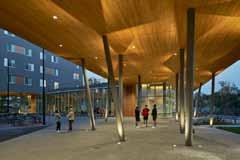

just do it.’ But I’ve never, ever seen the kind of community support we get here, and I’ve been in a lot of other school districts.”
The district gets a lot of support from the business community. The local FBT
Bank donates significant money, as do various local businesses, some headed by Fordyce alumni. Businesses many years ago donated plaques featuring the Ten Commandments and the American flag. The week prior to Report Card’s
visit, Fordyce Elementary Principal Rhonda Lawson received a grant from State Farm Insurance for materials and supplies. The Redbugs are the defending state 2A champions in football and have excelled in other sports in recent years. Local businesses donate breakfasts on Friday mornings for the football team and the cheerleaders and also provide pregame and postgame meals.
Like many rural Arkansas communities, Fordyce has had its struggles in recent years. The district lost a major employer when Georgia-Pacific closed its plywood mill in 2009. The wood industry has faced other struggles. The schools suffered as a result. When Lawson started working as a third and fourth grade teacher in 1994, there were six to seven teachers per grade level, and now there are three. When High School Principal Chase McCollum graduated in 2005, the district was a 4A school in
athletics with 1,100 students. Now it’s a 2A school with 775 students. All of the students’ meals are paid for through the federal Healthy, Hunger-Free Kids Act. Hubbell, who is from nearby Monticello, says the district has “some of the worst poverty I’ve ever seen.”
The local economy’s struggles mean the district pays teachers the state minimum salaries, which makes it hard to attract outsiders. In response, administrators have decided to nurture homegrown talent. The district recently hired a hometown college graduate to teach a middle school social studies class and be an assistant coach.
Amber Ryan, a fourth grade math teacher, is one of those homegrown teachers. Taking a break outside, she said, “I have lived and breathed Fordyce Redbugs. I went to school here, graduated in 2006, and so to be able to be a part of the community and give back to this community as a teacher, it’s just great. … I think we’re just such a small

town, close knit, and we all care about each other.”
Fordyce is the home of legendary Alabama football coach Paul “Bear” Bryant, and during the interview Hubbell sported a mask designed with his familiar houndstooth hat decor. She laments the ticket sales that were lost because of COVID-19 the year after the Redbugs won the state championship. But she said that championship helped the school produce revenues in other ways. In January, 69% of voters passed a 5-mill millage increase.
“That’s huge. I’m not going to lie to you: That got the millage passed,” she said with a laugh. “It’s huge. So many problems go away when you’re a state champion.”
The millage increase paid for pavement work, heating and air system improvements, and security doors. Although members of the community were well-acquainted with the schools’
Continued on next page



we make bright futures possible with every build
ADMINISTRATORS. Dr. Judy Hubbell, left, is superintendent of the Fordyce School District. With her are Fordyce Elementary Principal Rhonda Lawson and High School Principal Chase McCollum.

potholed driveways, security was probably the biggest selling point. Administrators say community members are completely supportive of the district’s efforts. School resource officer Keith Axsom explained, “This is one of those small towns that if it wasn’t a big deal any more, we’d still have our rifles in the back of the truck.”
This is Hubbell’s seventh year and third as a superintendent. She came to Fordyce as an assistant high school principal but 12 days later moved into the principal’s slot. Her assignment was to clean up the school’s discipline issues, which she said were harming relationships with the community. There had been a time when continuity was lacking, which resulted in less community involvement, McCollum said.
Hubbell came to Fordyce out of retirement during a difficult time in her life. She had been a classroom teacher, a literacy specialist at a Pine Bluff-based education cooperative, and an assistant professor at the University of Arkansas at Little Rock. Her 94-year-old mother and her sister, a victim of an aggressive form of lymphoma, had recently died.
“I buried my mother and my sister three weeks to the day apart,” she said. “And I was in retirement then, and I found that I wasn’t doing much but getting up and showering and putting on fresh pajamas. And one day I said, ‘You know what? There’s something wrong with this.’ And I saw a little bitty ad in the Democrat-Gazette that they wanted an assistant principal at Fordyce. And I thought, well, it’s August. Somebody
has died. So I called. They said, ‘Yeah, come over. Interview.’ And I did, and before I got back home, the superintendent called and offered me the job.”
Strong church support
Churches are especially supportive of the district. The Fordyce Community Baptist Church and the First Baptist Church partner to collect lower-income individuals’ laundry, wash it at the laundromat and fold it. School librarian Kim Archer is one of the First Baptist Church members who participates in that effort.
That’s just one of the services provided by the Community Baptist Church, whose pastor is Roderick Rogers, husband of the district’s assistant principal, Lena Rogers. The church provides truckloads of food and clothes to needy families. The day Report Card visited, it was offering a drive-thru food giveaway through the federal government’s Farmers to Families program. The Rogers family lives just across the fence from the school with their daughter, Kinley, a sixth-grader. Roderick is also head of the school’s basketball boosters, which had recently raised enough money to purchase shoes for all the boys players.
“I think that our small town, we just like to take care of each other around here,” said Lena Rogers. She later added, “Here, we’re all on the same page. I
think we have the same agenda, which is educating our children and just helping them to be good citizens.”
Other churches have personal connections to the district. Teacher Heather Flowers’ husband is the pastor of Zion Baptist Church. Ronald Smead, that church’s minister of music, is the girls basketball coach. His wife, Jenny, works in the central office and provides great directions to the school over the phone.
Churches are involved in other ways. About 10 contribute to a food program serving about 30 lower-income families. Churches bring food for the hospitality lounge for basketball tournaments. The nearby Assembly of God church opens its fellowship hall for ACT testing. A member of that church wrote a grant for each student in grades K-5 to receive a pair of tennis shoes. The First Baptist Church recently brought faculty members two boxes of Nothing Bundt Cakes. The chain’s Little Rock bakery is owned by Fordyce graduate Stacy Lindsey.
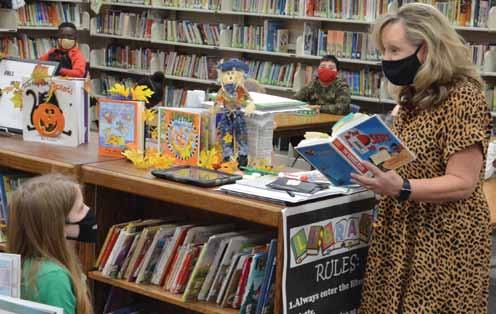
When Hubbell became the district’s high school principal, she asked the superintendent, Dr. Albert Snow, if she could contact a church to see if it would
feed the teachers on the first day of training. That practice had occurred in other districts where she had worked.
Continued on next page
Welcome students, teachers and parents back to school with confidence. Indoor air quality, energy costs, and building system reliability are more important than ever. Our 100 years of expertise managing and improving indoor air quality can provide you with the science-backed information you need to leverage your school’s HVAC systems to address health risks. Trane is here to help.
Each building is unique - let’s start the conversation. Contact Trane Arkansas • 501-366-4252 • Trane.com/k12
“So I called, and before long I had churches calling me: ‘We want to do that, too. We want to do that, too,’” she said. “We got to the point where we were fed every day that first week of school when it’s just the teachers here by a different church, and I’m talking a big spread. I mean, good food. And then some of them were like, ‘Well, can’t we help, too?’ So we said, ‘OK, you can bring breakfast.’ So it got to the point where we had breakfast the whole week, lunch the whole week.”
There is no private school in Fordyce, and there are few homeschooling families in the district. Hubbell said when she was first hired as superintendent, the First Baptist Keenagers, a ministry for senior citizens, asked her to speak. She told them many people are concerned that God is being removed from public schools. She does not believe that’s so.
“I believe in the separation of church and state,” she said. “We don’t need to be indoctrinating kids. But we can show them how decent human beings live. We can show them how you live an honorable life. We walk the walk. And I think that’s probably the best sermon that can be preached.”
Like other districts, Fordyce is trying to navigate its way through the COVID-19 pandemic. When Report Card’s visited Oct. 21, only three students had tested positive. A week or two previously, the entire junior high football team had been quarantined after a player tested positive, causing it to miss a couple of games. Then on Nov. 16, Hubbell announced that all students in the district would shift to virtual learning through Nov. 30 because several students had tested positive while
Since 1960, the education community has turned to American Fidelity for employee benefits, education, and enrollment support they can trust. Consider joining the 122 school districts in Arkansas that currently partner with us.
Learn more at americanfidelity.com/education or call us today!


the seventh grade and junior high basketball teams had been quarantined.
Sunni Mathews, a school nurse, is one of the point persons for the district’s coronavirus response. When a positive occurs, she checks video footage, seating charts and bus video to determine who has been in direct contact with the infected person for 15 minutes or more. She contacts parents to tell them to pick up their children and tell them when they can return. So far, parents have been understanding.
Mathews said she takes her job seriously.
“It’s like I told some of the teachers and coaches and staff, if I don’t do my part and send people home when they need to be, it’s on my conscience if a kid takes it home and gives it to a grandparent who’s elderly and has health conditions,” she said.
Most students are choosing in-person instruction, and many of those that first didn’t are now doing so. Lawson’s elementary school went from almost 80 virtual students to 40. Six had returned Oct. 20. Only about 20 high school students were at home at that point.
While the district won’t let students move in and out of virtual instruction, Lawson said it was important to get those students back in the classroom.
“My perspective is, the sooner the better because you can get behind really fast. … I’d rather get them in there quicker because usually when they come back to us, they’re behind because they haven’t been doing their work,” she said.
Broadband coverage is lacking, so the school has provided portable hotspots to students who live in outlying areas and
don’t have access. Having enough digital devices isn’t a problem. Fordyce is not only a “one-to-one” district where every student has a device, but it’s actually a two-to-one district after using federal CARES Act money to buy new Chromebooks. Those remain at school while the older ones stay at home.
Mask compliance has been good so far, administrators say. The first day of school, 100% of the students were wearing a mask.
“I’m telling parents at parent-teacher conferences I’m proud of the way our parents have supported us in the mask of their child,” McCollum said. “I had prepared myself and my faculty, like Rhonda, we were all preparing for kids to come with no mask or just not wearing the mask, and the kids have done a really good job.”
The pandemic has been another opportunity for the community to support the school. The churches didn’t feed faculty members the first day of train-
ing, so a local woman and her husband brought boxed spaghetti dinners she had cooked that morning. Parents have been donating disinfectant wipes even though the school doesn’t really need them.
Asked how other districts can encourage strong community support, McCollum emphasized giving stakeholders a voice. Districts should know who the district’s taxpayers are and know how it can serve them. Hubbell encouraged districts to harness the power of social media. She tries to post 1-3 positive things a day about the school. She and Lawson said parents need to know the school cares about their children.
“You’ve got to show the people that you care about their kids, and you’ve got to treat those kids like they’re your own,” Lawson said. “I ask my teachers all the time in staff meeting, ‘Are you the teacher that you would want your child to have?’ You’ve got to be that person. You’ve got to show the community that you care.”



CONGRATULATIONS.
Fort Smith’s Susanna Post took a nontraditional path from the classroom to the oil industry and then back to the classroom
By Steve Brawner Editor
The 2021 Arkansas Teacher of the Year says empathy is the key to reaching students.
Susanna Post, who teaches at the Fort Smith School District’s Belle Point Alternative Center, learned of her award the same way past Teachers of the Year have learned of theirs – by surprise.
Post, who previously was named a regional semifinalist, walked into a room full of socially distanced well-wishers and dignitaries Oct. 19, realized what was happening, and cupped her hand to her mouth.
“I’m shocked, completely shocked, and still shaky,” she said after hearing the official announcement from Education Secretary Johnny Key. “This does not happen in isolation. I have been incredibly supported by my administrators and by the teachers that are in this building.”
Post, the 2020 Fort Smith Teacher of the Year, has been teaching classes at the Belle Point Alternative Center for five years. Key said she has built a positive rapport with students, teachers and administrators. In one project, students used math to design tattoos with help from four local artists. She co-taught with a special education teacher, initiated the school’s first Coding Club, helped create an ACT preparation program, facilitated a literacy intervention group, and served on the district’s secondary math curriculum development teams. She leads the school’s Culture Project Week, which includes
project-based activities that improve school culture.
Her platform will be “Closing the empathy gap.”
“I have learned as much from my students as they have learned from me, and a lot of that has been centered around empathy and understanding them and what they need to learn,” she said. “So I’m incredibly excited to get to share that with I don’t know whom, but we’ll see. The whole state of Arkansas, I guess.”
The award means Post is eligible to be the National Teacher of the Year. It netted her $14,000 in addition to the $1,000 she received when she was named a regional finalist and another $1,000 she received after being named a state semifinalist.
Joel Lookadoo, an instructional facilitator and former math teacher at Lakeside Junior High School in Springdale, is the current Teacher of the Year.
When her term starts July 1, 2021, she will travel the state representing teachers and will serve as a non-voting member of the State Board of Education. That duty will give her a chance to represent her students from a policymaking position, which is important to Post.
“I can’t say that I was one of these kids growing up like the kids that I’ve taught here at Belle Point, but I now understand their stories, and I understand what motivates them, so I feel like my voice on the board is representative of all of their voices,” she said. “And I’m just, I’m ecstatic that I get to represent them in a way that maybe they haven’t been represented in the past.”
Post has taken a nontraditional path to becoming Teacher of the Year. She started her teaching career in July 2002 in Raleigh, North Carolina, and then left the classroom because of a family move and began working as a petroleum analyst and senior engineering technician at oil and gas companies in Dallas and Fort Worth. She remained in that industry when the family moved to Fort Smith but found
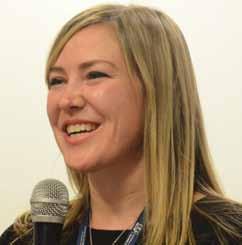
there were fewer opportunities in Arkansas, and she wasn’t feeling fulfilled. When she taught some evening algebra classes for a local homeschool cooperative, she said she “got the teaching bug” She earned a master’s degree in teaching from the University of Central Arkansas and then another master’s degree in rural and urban school leadership from the University of Arkansas at Little Rock.
As an alternative learning teacher, she works with students from challenging circumstances. Her principal, Dr. Tony Jones, said she is prepared every day for a classroom where anywhere from one to 15 students may show up.
“If I’d have known I was going to lose you for a year, I probably wouldn’t have nominated you,” he said at the ceremony.
Post said her experiences in business have helped her show students how they will use math in the real world.
“If there is one message that I would send to teachers, it would be that relationships are so critical to everything that happens in your classroom, and I know that there’s a lot of pressure to cover content, but if you cover all that content but students never learn anything, then it was all for nothing,” she said. “So I think part of rising to this level of success in teaching is making sure that relationships are first, and then secondly that your content is meaningful to kids, and that they see some value in it for themselves personally. … It all comes back to knowing them and knowing what their interests are.”

Superintendent David Woolly details the successful bond proposal.
Normally, when a school district needs funds for capital construction projects, it does not ask voters for less in taxes. But that is exactly the plan the Alma School District proposed and its voters endorsed on Nov. 3, when they approved bond initiatives that will both lower their millage — from 43.4 to 42.4 — and also generate $10 million for much-needed construction projects.
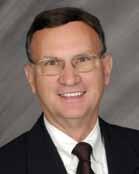
“We use the term perfect storm from time to time, and usually we mean something negative by that,”
Alma Superintendent David Woolly said. “Well, this was a perfect storm, but it was a positive of several things coming together at once that made everything work.”
Woolly details the confluence of fortunate events, how the construction funds will better Alma students’ professional prospects, and what Stephens Public Finance has done to help the district wade through a pile of paperwork “literally a foot tall.”
What was the district’s bond situation when it went to the district with this proposal?
The last major construction projects in the district that were funded by bonds were completed about 15 years ago. The bonds that financed that construction, about $35 million to $40 million, were sold about 20 years ago. That was the last time we sold bonds, and we have been paying on them ever since. If we did nothing at all, in 19 years those bonds would have been paid off. Of course, it is common for districts to pay off bonds early and refinance them.
And that is what voters in your district agreed to do. Can you describe the bond issue?
It is a new bond issue that will go out 35 years. A large portion of the bond issue will go to pay off the existing bonds. By taking our existing debt and paying on it over the next 35 years, instead of the next 19 years, we dramatically lower our payments — just like refinancing your house.
In addition to refinancing our existing bonds, we are selling the new bonds for $10 million more than what it takes to
refinance our existing bonds. That is where the $10 million for new construction comes from.
The other part of the perfect storm is the record-low interest rates right now, which applies to school bonds, too. We anticipate these bonds selling at a very low rate, far lower than what we are paying on our bonds now. That also lowers our annual payment. So, if our annual payment is lower than the amount of money we need to have coming in from taxes, we want to give that back to people in the district by lowering the tax rate.
What was the impetus for the bond proposal?
Like most schools in this part of the country, Alma High School had an agriculture education program forever, up until about 10 years ago. With the program ending 10 years ago, when we restarted it in fall of 2019, we did not have really good agriculture facilities. We started the program in a regular classroom, which was OK for getting going, but obviously that is not OK for the long term if you want to have a high-quality program that meets students’ needs. So, we knew we were going to need to build something, and sooner rather than later.
How will these new agriculture facilities benefit students’ education?
Agriculture is far more than soybeans and cows, which are certainly important, along with every other kind of crop and livestock. Agriculture is also welding and other skills you learn in a machine shop. The new agriculture building, which will be physically attached to the high school, will have that. Right out the back door of that building will be a greenhouse, where students will learn about growing crops.
Farther out, there will be a barn for livestock education. We have some students who live on working farms but not very many, even if their parents are involved in agriculture. So, if a student is going to raise livestock, they do not have a place to do it. They cannot raise a cow or pig in their backyard. That is why modern agriculture programs have barns, including everything from pig pens, pasture land around it, and facilities for medical treatment of the animals.
Besides the new agriculture facilities, what else will the $10 million in construction funds pay for?
We built one of the first multipurpose student activity centers in Arkansas about 25 years ago. Now, it is nowhere near state of the art in terms of size. The new facility will basically


look like an indoor football field, but the football team is the student organization that will probably use it least. We have a very active and strong Navy ROTC program that drills every day; in inclement weather they will have a place to do that.
Our marching band will use it for the same reason in the fall. We have a strong robotics and engineering program, and this will be the perfect place for big robotics competitions. It will also be perfect for our science fair and History Day, which is like a science fair for history. So, this will truly be a multipurpose student activity center. Construction should closely follow and overlap some with the construction of the agriculture facilities, which we hope to start on in the spring.
The administration building is 41 years old, and the only thing we have done to it in 41 years is have it recarpeted. In the meantime, our enrollment has increased by about 40%, which means more administrative staff. Right now, we have people who ought to have their office in this building but are spread out all over the district, just anywhere we could find a place to put them. So, we will expand this building and bring all those people into this building, and it will greatly improve our efficiency and our operations.
We will also do a great deal of parking lot and driveway work. All of our parking lots and driveways were last paved in 1989, and it is really only designed to have a life of 15 to 20 years before you need to overlay it. And if we wait any longer, we would have to tear it out and start all over, which is much more expensive; whereas right now we can just overlay it with fresh asphalt.
We also have some roof work we need to do. You do not want to wait until a roof is leaky before you work on it.
The last piece of all this goes back to the administration building. Fifteen or so years ago we purchased a building across the street from our administration building that had been built as a doctor’s office, and we converted it to office space for our people we did not have space for in the admin building. When we get them moved into here, we are going to convert that building to be used for an early childhood education program.
What kind of partner has Stephens Public Finance been for the district?
Stephens has been our financial advisor for bond issues forever. Well, not forever, but this is my 49th year with the district, and Stephens has been our financial advisor at least that long.
And in my 30-plus years as an administrator, we have worked with only three different people. They are great to work with. The selling of bonds has always been kind of complicated, and it would be absolutely impossible for a district to do a bond issue without a financial advisor.
What makes bond issues so complicated?
After the new financial laws in 2008, the paperwork doubled. I am not exaggerating. The forms that you have to fill out, the things you have to check and attest to — a district could not do that. That is why you want to work with somebody like Stephens. At the end of this, the documents that our school board president and secretary will have to sign will be literally a foot tall. You dang sure do not want anything in there that you missed. So, Stephens is there for there to be sure no stone is left unturned, that the district can make the payments, and that the bondholders are going to get their money back. It is a lot of work.
Is there a message you have for voters for approving the proposal?
We could not have done all this without the voters having trust in us. On behalf of our students, our thanks go out to them for agreeing to our proposal. Of course, they were helping themselves out, too, by lowering their taxes. This will benefit lots and lots of people. Like I said, it was a perfect storm.

Kevin Faught Senior Vice President (479) 718-7444 kfaught@stephens.com
U.S. Department of Education creates new procedures for how school districts should respond to allegations
If dealing with a pandemic were not enough for school administrators to handle in 2020, the United States Department of Education has published new Title IX rules that greatly change the way K-12 schools must respond to allegations of sexual misconduct, for both staff and students.
The new rules, which became effective Aug. 14, significantly increase the due process protections for both the person complaining about sexual misconduct, otherwise known as the “complainant,” and the person accused, or the “respondent.” The rules for students are incorporated into ASBA Model Policy 4.27.
Essentially, the rules establish a formal grievance process for investigating sexual misconduct violations. The process includes detailed steps and timelines that must be followed, and notice requirements that can seem awkward and sometimes like overkill in a K-12 setting.
The standard for schools in responding to sexual misconduct remains the same: A school cannot be deliberately indifferent to acts of sexual misconduct in its programming but instead must take prompt remedial measures to stop the misconduct and provide supportive measures to the complainant.
However, the big change in the rules is the formal process that must be followed when sexual harassment or sexual misconduct is implicated – which generally includes sexual advances, sexual assault or threats, and gender-related insults or gestures that are unwelcome and are severe, pervasive and objectively offensive.
There are about 2,100 pages of the rule, including the summaries and guidance. Alas, here are the high points.
• Every district must have a highly trained Title IX coordinator. This is not an in-name-only position, but instead this person will be charged with

by Cody Kees Attorney at law
The standard for schools in responding to sexual misconduct remains the same: A school cannot be deliberately indifferent to acts of sexual misconduct ... ” “
reviewing complaints under Title IX and implementing the district’s response under the rule. The Title IX coordinator takes the official complaint and can initiate his/her own complaint if the circumstances necessitate. The coordinator’s contact information must be on the district website.
• Every district must have an administrator capable of investigating the complaint. The administrator must be separate from the Title IX coordinator, as there are times when conflicts would prohibit the coordinator from conducting the investigation. The Arkansas River Education Service Cooperative is putting together an “investigative team” of retired administrators who will be able to assist districts with investigations, which will help avoid any potential alleged bias and otherwise alleviate the workload for smaller districts.
• There is now a formal grievance process that includes the investigation where both the complainant and the respondent are advised of all rights. These rights are outlined in ASBA Model Policy 4.27. Parties are able to consult with an attorney or adviser before being interviewed, and are able to provide evidence for the investigator to consider. The investigator must share all relevant evidence with both parties so either can respond in writing. The investigator must issue a report of the findings, and
thereafter the parties can respond to the final report.
• Each district must have a decision-maker separate from the investigator and the Title IX coordinator. This is ideally a district-level administrator but not the superintendent, as the parties can appeal the decision, and the one to whom they appeal should be the superintendent. If the decision-maker recommends expulsion, it would be taken before the board as usual but separately from the Title IX determination.
• During the entire process, the district must make available support measures for the parties. For example, during the investigation the complainant is allowed to change her schedule to avoid interacting with the respondent, or the complainant can be offered mental health therapy.
Be sure to use the right policy
Districts should be very careful about using their sexual harassment policy (ASBA Model 4.27) when the circumstances would not meet the policy definition of sexual harassment/misconduct.
Instead, if the conduct on its face does not rise to sexual misconduct protected under the policy, use ASBA Policy 4.18 – Prohibited Conduct, which addresses generally unacceptable behavior, or 4.43 – Bullying. Both policies would allow you to address bad conduct that does not rise to sexual misconduct without implicating the arduous Title IX grievance process. If you ever cite Policy 4.27, or use the term “sexual harassment” or “sexual misconduct” in a discipline letter, then you have implicated the Title IX rules and are then required to follow the grievance process.
The new Title IX rules can be overwhelming. When in doubt, school districts should consult the ASBA model policies and reach out to their legal counsel for guidance. Over time, with practice and training, the rules will become more manageable.
Cody Kees is a partner at Bequette, Billingsley & Kees, P.A. His partner, Jay Bequette, serves as ASBA’s general counsel.
Board members can be a “valuable force multiplier” during the COVID-19 pandemic by working as a team using best practices, said Dr. Anne Butcher, ASBA board development director, during the Region 1 annual meeting.
Butcher said that “what happens in the boardroom echoes in the classroom, among the staff, and in the community.” Board members and school leaders should project confidence, be disciplined, and be detached or engaged at the appropriate times.
“How we behave and how we respond to things, we can either quell anxiety, or we can increase it,” Butcher said. “We can make decisions based on facts, or we can just react in fear because of instability. You will be perceived as acting with integrity, honesty or humanity, or you can be perceived as in the opposite way.”
Similar messages were shared in other regional meetings this fall. Because of the pandemic, the meetings were held virtually.
Board members should provide oversight, no matter how badly they want to get involved and become an unpaid school employee. That role doesn’t change just because of the pandemic. As ASBA Staff Attorney Kristin Garner explained, sometimes it’s better to give people a phone number or referral than an answer.
“Always ask yourself, is it somebody else’s job that they get paid to do? And if that is the case, it is not your job to do it,” she said.
Even though this is a year like no other, some things shouldn’t change. Garner said she has seen situations where staff was trying to make policy because this is a crisis situation. But school districts should be thoughtful, not reactionary, when changing policy. In fact, she said they should be creatures of law and policy.
Dr. Mike Hernandez, incoming director of the Arkansas Association of Educational Administrators, said board members and superintendents must work together and be unified, even though they’re supposed to keep some physical distance from each other during the pandemic. He said administrators are busy right now, so school boards should limit emergency meetings.

He said board members should find ways to “overcommunicate” with the community. People are seeing so much on social media, but they just want the facts, he said. The district should speak with a unified voice through the superintendent or a spokesperson. Doing otherwise just adds to the confusion.
“Everybody and anybody you know wants information,” he said. “They have great, sometimes helpful suggestions. Sometimes they have harsh critiques about how you can do things better. The truth is, even though you may not be a first-year superintendent or a first-year
board member, you’re a first-year COVID person within the district. And so it’s important that you guys rely on each other and spend time together.”
Garner warned school board members to be extra careful about what they post on social media. Leaking information on Twitter or Facebook could create a liability situation.
She said information should be presented in a clear, calm and reassuring way, and it should be factual. The leadership team should promote messages that are legally sound and don’t violate student privacy, which is easier done when one person releases it. The district can show leadership not just on education issues but also can be a primary source of information on health and nutrition.
Hernandez said board members also will play a role in resource oversight. It’s yet to be seen what kind of impact the pandemic will have on revenues. So far they appear to be on track based on what’s collected in the first 25 mills, and then the state ensures districts receive their foundation funding. However, many districts have millage rates above

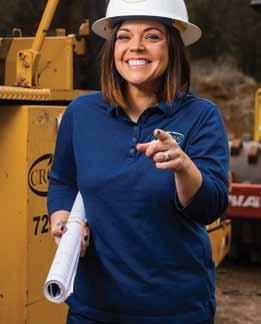

Lawmakers prepare to return to Little Rock in January after proposing the largest funding increase for schools in years. What else happens – and how it all will look during a pandemic – remains to be seen.
By Steve Brawner Editor
ASBA staff members head into the 2021 legislative session encouraged by the Adequacy Committee’s recommendation that schools receive a 2.33% increase in foundation funding – the largest in at least a decade – that was included in the governor’s budget that he submitted to legislators in November.
In October, the House and Senate Education Committees recommended a $99.7 million increase in public education funding for fiscal 2022 and an $86.9 million increase for fiscal 2023. Per-pupil foundation funding would increase from $6,985 this current fiscal year to $7,131 in fiscal year 2022 and $7,281 in fiscal 2023, as reported by the Arkansas Democrat-Gazette.
The recommendations must be approved by the entire Legislature, which typically happens with relatively little debate.
ASBA Governmental Relations Director Dan Jordan said the numbers are good news for school districts. He and other ASBA staff members enter the legislative session as optimistic as they have been in years.
“This is well received all across the state,” he said. “We are very, very pleased. We appreciate the hard work that the Legislature put in to arrive at this recommendation, and we appreciate and thank them for bringing this recommendation forward.”
The House and Senate Education Committees made their recommendations knowing school districts have faced increasing expenses during the COVID-19 pandemic. Schools have had to purchase technology, hire staff and substitutes, and deliver meals. Some expenses have been covered by federal funding, but some haven’t. Also, some districts lost students in the third quarter, which will lower their average daily memberships and therefore their state funding. Rep. Bruce Cozart, R-Hot Springs, the chair of the House Education Committee, said lawmakers considered projected state revenue forecasts and expected cost of living increases. Legislators recommended other funding increases that were incorporated in the governor’s budget. Enhanced Student Achievement (ESA) funding
would increase from $1,576 per student this year to $1,612 for districts in 2023 where more than 90% of students qualify for free and reduced price lunches. It would increase from $1,051 per student this year to $1,075 by fiscal 2023 for districts where between 70% and 90% qualify. In other districts, it would increase from $526 per student this year to $538 in fiscal 2023. Legislators also recommended categorical funding increases for alternative learning environments and English language learners.
The committees also recommended setting aside $15 million each fiscal year to help districts pay for increasing teacher salaries. The minimum salary will rise to $36,000 a year by 2023 because of legislation passed in 2019. Legislators provided $60 million in 2019 to help districts cover the cost of those increases over four years but did not provide money afterwards, which has districts concerned about reducing staff, programs and activities. The formula for how the $15 million would be distributed has not been decided.
Legislators this year hired Augenblick, Palaich and Associates to complete an objective and comprehensive adequacy study and provide a report by the end of 2020. The report will contain recommendations regarding general policy and matrix items, though it will
not include specific funding amounts. The report was not completed for use with the adequacy report submitted by the Education Committees in October. However, Jordan said it will be interesting to see how legislators respond to the new information.
Naturally, the COVID-19 pandemic will underpin the entire legislative session, starting with the physical layout of the session itself. At least 17 of the state’s 135 lawmakers have tested positive for the disease, according to the Arkansas Democrat-Gazette.
Speaker of the House Matthew Shepherd, R-El Dorado, said lawmakers will take precautions to prevent spread and minimize the number who have to be quarantined, while at the same time conducting the people’s business. Mandatory masks are being considered. The House and Senate have installed plexiglass dividers in their chambers as well as in the largest committee meeting room, Room A of the Multi-Agency Complex behind the Capitol. In other committee rooms, the focus will be on physical distancing. Seating will be limited, and committee chairs will have discretion as always to limit crowds. At the same time, lawmakers are working on providing direct feeds so people can be watching nearby and then can be called into the room to testify. Shepherd said House members will try to announce in advance exactly which bills will be heard in committee that day rather than having long agendas where members of the public feel they must attend in case the bill they are following is run.
Shepherd said he has been pleased by the membership’s response to the pandemic. Schools and businesses have had to adjust to its realities, and so will lawmakers.
“For me, I want it to be as normal a session as possible,” he said. “I want the members to know if they’ve got legislation they want to file, they can file it. If they’ve got legislation they want to run, they can run it.”
ASBA staff members are often at the Capitol during the session monitoring the progress of legislation affecting schools. Other school advocates such
as the Arkansas Association of Educational Administrators along with school superintendents attend meetings as well. Like lawmakers, they will be balancing work and safety. Jordan said ASBA staff members may follow meetings online more than in normal years, but when necessary they will be at the Capitol following protocols, wearing masks and keeping their distance.
This session could permanently codify into law the temporary changes that have occurred during the pandemic. Jordan said ASBA staff members will be closely monitoring proposed legislation. As always, they will use three filters: Is it good for students? Does it create an education ethic? Is everyone held accountable? Once they’ve done that, they’ll consider what they can support. They’ll be considering unintended consequences. If a bill is good for some districts and harmful to others, ASBA will take a neutral stance.
Each session, legislators introduce bills that would create vouchers, tax credits, tax deductions or scholarships to fund students who are not in the public school system. Private schools and other educational arrangements aren’t held to the same accountability standards as public schools, don’t require the same transparency and don’t have to respond
to Freedom of Information Act requests. And of course, the money they would receive would be subtracted from public schools.
Jordan expects there will be momentum behind such proposals this upcoming session. The changes schools have made in response to the pandemic have created an openness to new ways of educating students. ASBA will oppose any idea that takes tax dollars away from public schools and gives them to other types of educational methods with little to no accountability.
However, it is open to students having more options, and changes clearly are coming.
“What will education look like in two to three years from now?” he said. “I don’t know. But I’ll forecast it won’t be anything like the last 20-30 years. It will definitely have a new look.”
Cozart expects a big push for vouchers that would pay for students to attend school where they want or just keep the money and stay home and be homeschooled. Some school choice ideas are proposed every session, but given the events of the past year, they might get traction this time.
“I see a lot of radical ideas coming,” he said. “I just don’t know what they all
Continued on next page

are, but I really think … there’s going to be some imaginations really brought way out there.”
ASBA has been preparing its own legislative agenda by seeking input year-round from board members, administrators and legislators. It has sent out surveys to the membership in order to learn board members’ top concerns.
In responding to the open ended survey, several topics of concern were listed most often by the ASBA membership. The top items were adequacy concerns, foundation funding, the possible “funding cliff” when the $60 million in state funding to help districts struggling to meet the new minimum teacher salary is no longer available, ESA funding, vouchers, broadband community connectivity, and mental health needs of students.
The foundation funding and minimum teacher salary concerns have already begun to be addressed by the Educational Adequacy Committee’s recommendation for increased funding in the next biennium, followed by the inclusion of the committee’s recommended funding increases in the governor’s proposed budget.
Another concern voiced by several districts is the HungerFree Students’ Bill of Rights Act of 2019. It required districts to provide students a meal if they do not have money in their account or on hand. It does not apply to students who are eligible for free meals. It also required the meal to be the same one as received by other students, and it banned any form of “lunch-shaming” such as requiring non-paying students to wear an armband.
Few could argue with the legislation’s goals of ensuring every student has plenty to eat and is treated with respect. A concern is that the legislation removed incentives for parents to pay or even to apply for the National School Lunch Act program. Districts are reporting significant losses while incurring extra expenses delivering food during the pandemic. If fewer parents apply to be part of the program, it could affect school

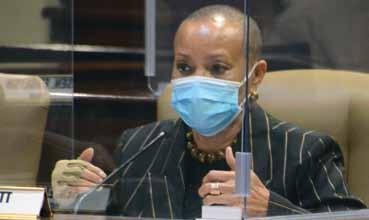
and
Committees Nov. 9. Legislators will be taking precautions during the COVID-19 pandemic such as wearing masks, limiting how many members of the public can be in a committee room, calling people into the room from outside to testify, and announcing in advance which bills will be discussed.
districts’ eligibility for the state’s poverty-related Enhanced Student Achievement programs.
The issue is complicated by the fact that earlier this year, the U.S. Department of Agriculture issued a directive that all students could eat free during the COVID-19 pandemic. It was originally scheduled to end Dec. 31 but has been extended through June 30. Districts are being reimbursed for the cost. However, by August 2021 it will have been two years since families have had to submit forms to qualify for free and reduced price meals. Meanwhile, families who did pay will have grown accustomed to the free meals.
ASBA would like districts to be held harmless regarding ESA funding if they can’t get accurate counts on free and reduced meal applications. As for the Hunger-Free Students’ Bill of Rights Act itself, ASBA staff members have been discussing a fix with other associations. Cozart said he doesn’t expect a big change to the law, which he strongly supports.
“In fact, I would love to see it just feed everybody,” he said. “I’m serious. Let’s don’t collect money. Let’s just feed everybody lunch or breakfast, whatever it takes to feed them and not discriminate against whether they have money or don’t have money.”
He said money may be available through the federal government. Many schools have 60-90% of their students on free or reduced lunch plans anyway.
ASBA would like to see other changes made to ESA funding itself. Restrictions on the use of ESA funds should be removed in order to provide schools maximum flexibility. The association would like to see consideration given to providing adequate ESA funding for high-poverty rural districts. It also would like to see consideration given to changing the state’s tiered approach, where funding can drop considerably if a district drops to below 90% or 70% of its students on free or reduced price meals.
ASBA members also have expressed a concern about the state’s per pupil foundation funding matrix. The pandemic makes it more difficult to track students, and some will be lost to homeschooling. Members are concerned that districts will
have lower average daily memberships and see a loss of funding as a result.
There’s been an increasing sentiment among some legislators that they need more control over funding and that school districts should more closely follow the matrix they approve. Some legislators would like to turn the “funding matrix” that determines how much districts receive into a “spending matrix” where schools would spend closer to what is allotted for each budget item.
Sen. Jim Hendren, R-Gravette, a former school board member, said an inherent tension exists between state responsibility and local control. Lawmakers want to ensure the tax dollars they approve are spent efficiently.
“We know some of those categories are so far out of whack, particularly transportation funding,” he said. “The dollars that we spend on transportation funding have almost no correlation to the dollars that we know school districts actually spend on transportation. And that’s been a source of aggravation for many years, is we know that the matrix is not accurate again in comparison to what’s actually being spent.”
Hendren said legislators won’t be dictating salary schedules and staffing ratios to schools, but there could be increased scrutiny as well as the carrot of additional tax dollars in order to incentivize behavior.


“The politics of that get a little bit challenging,” he said. “Arkansas is a big believer in local control, and again, as a former school board member, I am too, but I’m also a believer in accountability and responsibility when you’re spending somebody else’s money.”
ASBA’s Jordan said the matrix should remain a funding formula, not a spending formula. The current formula allows schools to react to their own needs, which can be quite different than a neighboring district’s.
“Local folks know what their local needs are and should be able to adjust accordingly,” he said.
ASBA members are also concerned about how statewide assessments will occur during the pandemic. Mandated testing did not occur during the spring, so students will have gone two years between the state tests. Student performance could be negatively affected by the compromises districts have had to make in their instruction. Also, students who were the most vulnerable may have had the most difficult transitions to virtual instruction. ASBA members are concerned that districts won’t be able to achieve the required 95% participation rate and see their state letter grades reduced as a result. There also could be issues with assessing virtual students virtually.
The fix? One possibility would be for the state to hold districts harmless for issues related to assessment caused by the
pandemic. Additionally, the Arkansas Department of Education might request a federal waiver with respect to the spring 2021 assessments.
ASBA also will be monitoring any legislation that would move all school elections, including all millage elections, to November. Some legislators want to ensure such elections occur when voter turnout will be the highest. That sentiment was behind a law in the 2017 legislative session that moved school board elections from September to either May or November, whichever the district chose. The change in the law did not effect districts’ flexibility regarding millage votes.
ASBA doesn’t want to see any more restrictions on board elections. The May and November elections seem to be working. With millage elections, districts need to be able to react to local needs, funding opportunities and the bond market.
The regional meetings occurred prior to the election. In the Region 1 meeting, ASBA Staff Attorney Kristen Garner urged attendees to thank legislators who are not up for re-election and to ask those running for office about their platform. School board members should determine candidates’ stances on education issues and share their own views from their unique position as an elected official. That’s a good practice to continue now that the election has occurred.


By Steve Brawner Editor
William Campbell counts the number of superintendents he has helped hire in his 28 years as a McGehee School Board member and comes up with six, and then remembers it’s actually seven. It’s easy to lose count when you’ve been serving this long.
Service, in fact, is Campbell’s life. As a Division of Workforce Services manager covering five counties, he helps thousands of unemployed clients access benefits and find jobs. He teaches a Sunday school class of young people. And his fraternity does people’s taxes for them for free. As he explained, “My mom was always helping people, and so I think it’s just kind of rubbed off on me.”
Report Card sat down with Campbell in the McGehee High School library to talk about his southeast Arkansas district and how his full-time job dealing with employment issues affects how he looks at jobs and education.
You’ve been doing this a long time, haven’t you?
“Twenty-eight years. [Laughs.] It’ll be 29 next year.”
How did you get started?
“My school [in] Tillar consolidated with McGehee, did voluntary consolidation.”
You were on the school board there?
“No. I was actually mayor of my town in Reed. I live in Reed. I was may-
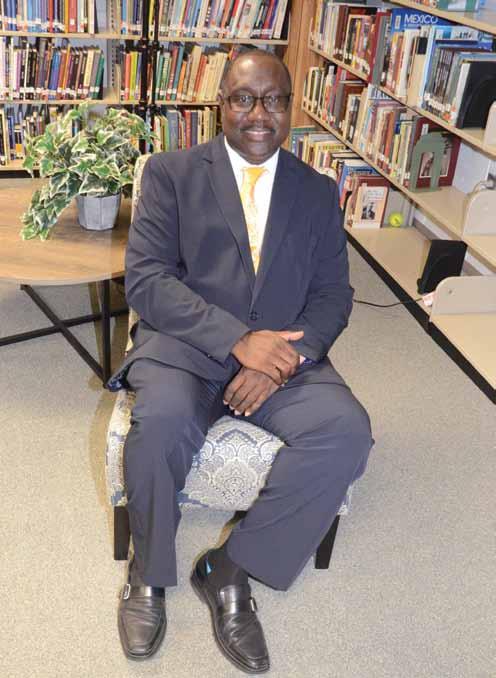
or there, and when we consolidated, I felt that I just needed to [join the board] because the kids were all panicking, the people were all panicking. Everybody was in an uproar about consolidating and moving and didn’t want to go, and I was just kind of like, ‘OK, they probably need somebody with a voice of reasoning.’ [Laughs] So I kind of took it upon myself to run.”
How hard was that consolidation, and how did you make it easier?
“Well, like I said, the people were panicking and stressed out and worried and didn’t want to close down. The school was small, and so [my attitude was], OK, I know what the kids need. This is not going to work anymore. It’s too small. We don’t really have the money to keep it open. Resources were short and we didn’t have band, we didn’t have the activities that everybody else had, and I thought these kids need to get out and get a better view of what’s out there.”
Did everything calm down?
“Well, the growing pains, probably the first three or four years every time somebody did something to a kid or they said something to a kid that the kid didn’t like, they would come home and tell the parent, ‘Oh, it’s because we’re from Tillar.’ And so we had to get that mindset out of the way and [say], ‘OK, we’re all one school district now.’ So probably the first couple of years we had that, but after that we grew into it.”
You’ve been doing this for almost three decades. Will you keep doing it a while longer?
“I plan to. I do.”
Why stick with it?
“My heart is in education. When I first went to college, I started out wanting to be a teacher, and then I had a death in the family, my father died, and I had to take care of my mom and all that. It took me a little bit longer, so I ended up changing my major to something else. But I want to see the kids grow. I don’t want the kids to come up thinking that this is it right here, so basically I want to just make sure the kids continue to grow and flourish.”
How do you think you have improved as a school board member in almost 30 years?
“Well, I’ve learned a lot. I met a lot of people that I’ve latched onto and
have become friends across the state and across the country. I’ve got really good contacts and a network, people that I can talk to, and I know just about everybody, so if I need to know an answer to something I can pick up the phone. I’ve got people I can call. …
“When I first started, I served as mayor of my town, so I was kind of familiar with parliamentary procedure and kind of understood that you can’t just come into the meetings and take over. … I just always remain calm. If there’s an issue going on, I don’t provoke it. I’m not going to sit there and let the people come in and take over, but I’m not going to provoke it, either. I listen to them, but more listening instead of talking and not trying to escalate it or anything like that.
…
“People would come to my house and want to talk to me about their kid not being able to graduate or talk about a teacher. And when they first came to my house, being a new board member I would kind of listen to them and probably led them to think that I was going to be able to do something when I knew I couldn’t. So now when they come to my house, it’s a whole ‘nother ball game. …
“When I first got elected – this is a matter of fact – the first night, when I got elected that night, and the polls came out, I went home and got a couple of phone calls congratulating me. About the third call I got was, ‘Congratula-
tions. Now you need to go out there and fix that cheerleader squad.’ [Laughs.] And I’m like, ‘I don’t think I can do that.’”
How many superintendents have you helped hire?
“Let’s see. We had Chris [Ferrell]. We had Mr. [Thomas] Gathan. [Barbara] Wood was back and forth a couple of times. Dr. Wood was probably about three times. Bobby Ashley. Miss [Diane] Barrett. I’m going to say six [including Dr. Dewayne Haynes]. ”
Wow. You might have hired the most of anybody in Arkansas. What have you found is the key to doing that?
“I would prefer if we have somebody in house that we could just groom and bring into the process. We used a firm when we hired the last superintendent. And this time – I’m on number seven, I’m sorry. Mrs. [Linda] Tullos is number seven. So we brought Mrs. Tullos in when she was already in house.”
Do you think that is preferable if you can?
“Yes. And living here in the Delta where we live at, you can’t get a lot of people to come move this way anyway, and so if you’ve got somebody down this area that’s qualified, I would say go for it.”
Continued on next page
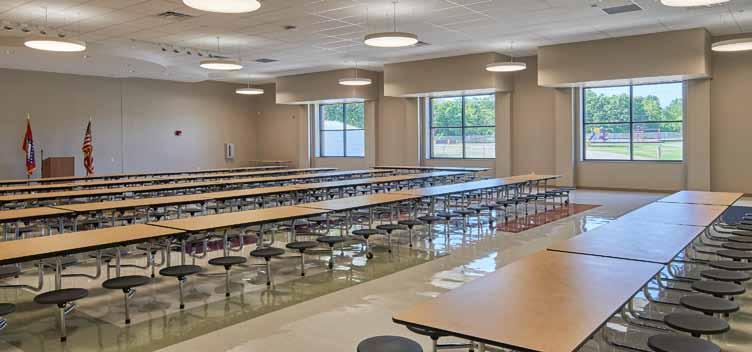
What are some of the advantages of being in McGehee?
“Small town, community, community oriented. They get behind the schools. We had a millage project when Mr. Gathan was superintendent, and the community came out and developed all this stuff, ‘Save our schools.’ They backed us a hundred percent. And the night we had the millage vote, we all met out here and people were cheering and screaming, hollering, and so they backed us up on that millage really well that night.”
You’re doing a building program right now. How did that happen?
“Well, we’ve been talking about the middle school concept for a while now, and STEM. We started robotics about two years ago, and then the kids took off with robotics, and so we decided to invest into the future with them with the STEM building, and of course expanding into the middle school.”
Why do you need a separate building for STEM?
“Because it’s taking off all of a sudden. We went from probably about five years ago, six years ago, from the kids not needing to know what a robot is into going into the state championship, winning robotics tournaments, and going cross country and all that. So the kids are really taking off with it.”
What have they produced?
“They came in here several times and did demonstrations with us on robots they made. They have the competitions out here at the gymnasium on Saturdays. I’m not sure when the next one is. They haven’t had one yet since COVID, but they are really, really taking off with it. … We have kids that, for instance, two of the kids in my Sunday school class that probably wouldn’t have ever really done a whole lot within any program are really deep into it. They live, sleep and breathe that stuff.”
How are you doing with COVID?
“We’ve had a couple of kids that had it here at the school, and we’ve had some teachers that I heard that had gotten it, but far as I know, we’re pretty much on top of it.”
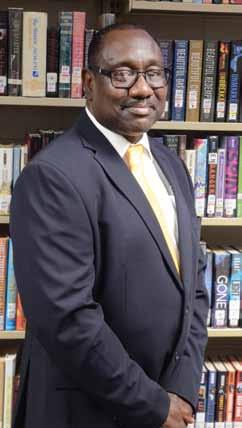
What has been the school board’s role in this whole process?
“Well, we’ve been meeting virtually ever since March. But we’re supportive of whatever needs to be done. Of course, when we meet every month, we discuss the plan, and we discuss what’s going on. We ask questions about that, so we’re very supportive. Whatever they need, we’re going to make sure they get it.”
What do you do for a living?
“I’m the manager of the Division of Workforce Services. I work in Pine Bluff and I cover five counties. … I live in Reed, but I work in Pine Bluff.”
Your job is to provide unemployment benefits or help people find jobs? What do you do?
“I manage all of it – unemployment, employment services, all the programs.”
So you’re helping people get benefits, and also …
“Benefits, jobs. We have another program called TANF [Temporary Assistance for Needy Families], which is an income-based program. We help with education so … we all provide a bunch of services.”
My heart is in education. When I first went to college, I started out wanting to be a teacher, and then I had a death in the family, my father died, and I had to take care of my mom and all that. It took me a little bit longer, so I ended up changing my major to something else. But I want to see the kids grow. I don’t want the kids to come up thinking that this is it right here, so basically I want to just make sure the kids continue to grow and flourish. “
”
There are two different sides to this pandemic. There’s the health care side and the economic side. What do you see from the economic side?
“We were doing the unemployment benefits, and they were doing the $600 a week plus the regular benefit amount, and that went on from March up until July, so as far as economics wise, people were getting pretty good checks during that time. Of course it stopped now, but then it came back and we did another $300. I don’t know what kind of stimulus package they’re going to pass this time, but with the stimulus package plus unemployment, we had people that were able to survive at that time.”
What do you see with the general attitude of your clients right now? How are they handling things?
“Stressed. Like I said, the stimulus $600 stopped, and a lot of people are panicking now because they were used to getting, you might get $600 stimulus, and you might have been getting $350 unemployment. [That’s] $950 a week. And so you’re going from $950 a week to $350 a week.”
So are they looking for jobs, or have they kind of quit trying?
“Part of the requirement for unemployment is that you have to be looking for work, and they have to do job contacts, and they have to … report them every time they call in.”
So are they trying?
“They’re calling in saying they are.” [Laughs.]
How does what you see in your job affect your school board service?
“That’s a tough question. Hmm. I know a lot of parents have become unemployed due to the COVID, and I know some are struggling. Some are struggling with financial issues. Of course, [all our students] get free lunch now, so that’s covered. I kind of know who needs the services and who doesn’t need the services. I can kind of know who needs what and who doesn’t need what.”
Does this affect how you’ll look at the budget?
“I wouldn’t say necessarily it would. Like I say, we’re going to watch for overspending for sure, but if there is something in there that I’m uncomfortable with or I think is not necessary, I’m going to raise questions.”
You deal with people who are unemployed all the time. Do you think, “I’m going to make sure my students don’t have to face this, and here’s how we’re going to do it”?
“I try to provide services where they know what we do. They know how to apply for jobs. I try to assist in all that as much as I can because I know a lot of kids are not going to go straight to college. They’re going to want to go into the workforce, or you might have some that want to go to [vocational school]. So I don’t just sit here and push, ‘OK,
you need to go to college; you need to go to college; you need to go to college.’ I’m one of those that, [it’s] whatever you’re good at. One of my Sunday school kids, when she graduated from high school, she went to CNA school, and I told her I was just as proud of her for going to CNA school as I would be for her going to RN school.”
What is your philosophy about work? What do you think about work and the jobs of tomorrow and what you want students to be looking at?
“The first thing I want is the kids to have good work ethics. That’s the first thing because the work ethics are really, really, really going downhill. … So the first thing I want them to get is good work ethics. And then come to work on time and showing up for work and doing what you’re supposed to do on a daily basis.”
Do you see that among your clients, that they lack a work ethic?
“Most of my clients lack work ethics. They lack it.”
Do you sometimes get frustrated? “I get frustrated.”
Do you ever tell them that? “I have.” [Laughs.]
Does it do any good?
“Some yes, some no. A couple of
times I’ve had people work in my office that I’ll tell them about their work ethics, and I tell them, ‘Look, this is the real world. This is not where you can come in and play on your cell phone and do everything you think you should do except for work.’”
And do you ever make that speech within these walls?
“I have.” [Laughs.]
To students?
“Uh-huh. A couple of times, we might have an expulsion hearing or something like that, and I have kind of stepped out of my room a couple of times in the expulsion hearing and kind of told the kid, ‘Look, you need to straighten up.’”
Do you tell them, “I deal with …”
“Yes, that I deal with these kind of people, and you need to straighten up.”
So what gives you hope?
“They’re still innocent, and I think there’s hope for just about anybody if they want to do right. There’s hope for just about anybody. But the kids especially, they’re still innocent, they’re vulnerable, they’re still learning, and they just need to see somebody that kind of wants to take them to the side and kind of tell them about it.”
Note: Executive Session is edited for length, style and clarity.

As a reminder, Stephens can assist board members with obtaining their required professional development hours.
Arkansas law generally requires that school board members obtain up to six hours of certified professional development on topics related to school operations.
ASBA has deemed Stephens’ financial advisors as certified ASBA trainers who are able to provide up to three hours of school finance training annually toward ASBA’s Boardsmanship Awards Program. Normally held in the evening, or now virtually, this free training workshop will address topics ranging from state and local funding revenue sources to debt financing of capital projects. This type of workshop can be particularly useful for boards considering how to finance future capital projects.
To learn more about how Stephens can assist your district, contact Michael McBryde of Stephens Public Finance at 501.377.2641.
Chartwells
K12’s 16,000 school lunch employees have served more than 100 million meals during the COVID-19 pandemic. From bus route deliveries to theme days at meal pick-up sites to innovative partnerships, Chartwells has continued to ensure students across the country didn’t go hungry.

School districts can start planning their foodservice program by contacting Kellye Neal at 501.615.3660 or at kellye.neal@compass-usa.com.

A desktop thermal imaging system.
Homeland Safety Systems’ newest release of the Thermal Imaging Camera System offers school districts three options that can quickly determine if students, staff members or visitors have an elevated body temperature. Homeland’s passive moving camera system can check many individuals at once, doesn’t require people to stop moving, and doesn’t require anyone to physically operate the system.
Powered by facial detection software, the system can automatically focus on an individual’s face and sound an alarm when an elevated body temperature is identified.
It has full access control capabilities with facial recognition for those loaded into the database and provides complete audit trails and temperature readings of those entering the facility. It can also determine if a subject is wearing a mask or not, and it can allow or disallow access to the facility based on a district’s current policies and access control system.
Homeland’s offerings also include a kiosk for medium and higher volumes of traffic and a handheld version for low-traffic options.
For more information about Homeland Safety Systems’ offerings, go to www.homelandsafetysystems.com or call 888.909.2261.
and three years of no lost-time accidents.

In 2019, Baldwin & Shell became the first major contractor in Arkansas to receive an award from the Arkansas Department of Labor and the Workers’ Compensation Commission for working one million man hours with no lost time accidents.
One year later in the midst of a pandemic, the company has doubled that statistic, achieving nearly two million man-hours with no lost time accidents. The company prioritizes safety for the sake of its employees, and also for its clients, most of whom are school districts with classes in session for at least part of the duration of the project. Reducing jobsite accidents is imperative where children and other members of the public will be in close proximity to that site.
For more information about Baldwin & Shell, call 501.374.8677 or go to baldwinshell.com.

Chartwells K12’s goal is to make sure students leave the cafeteria happier and healthier than they came in by serving food kids love to eat and creating custom dining programs.
Baldwin & Shell Construction Company has reached two million man-hours
Greenland School District is scheduled to begin construction early next year on a new 3,200-square-foot central office building designed by Modus Studio that will include five offices, a work room, and a boardroom that also serves as a multi-purpose space for the district. A double-height lobby connects to a “front porch” entry space while dividing the private office functions from the boardroom. A modernly composed brick façade will complement the character of the main school buildings, while interior spaces are flooded with natural light by the use of polycarbonate glazing.
For more information about Modus Studio, go to modusstudio.com or call 479.455.5577.

C.R. Crawford Construction team members, Prescott Superintendent Robert Poole, faculty, staff, and community leaders, along with some energetic students, broke ground to mark the start of construction for a 46,915-square-foot elementary school. The single-story facility will include 18 classrooms, a gymnasium, library, computer lab, cafeteria, and several faculty offices.
“This is a dream come true for me as a superintendent,” Poole said. “We came together as a community to pass a millage to build a much-needed new elementary school for our kids. I am so excited for them, our community, and our future kids!”
The school was designed by TrullHollensworth Architects and has a completion date set for summer 2022.
For more information about C.R. Crawford, go to crcrawford.com.

WER Architects/Planners offers more than 20 hardened storm shelters from FEMA to ICC 500. The firm’s
experience and expertise will help keep students safe and will help schools comply with the next iteration of Arkansas’ building code, when all new school construction projects built for 50 or more students will be required to provide a storm shelter within them. Storm shelters also can offer a large-format educational space year-round.
For more information about WER Architects, go to werarch.com.

Hight Jackson Associates designed Bentonville’s Grimsley Junior High School, the district’s fourth junior high.
The new two-story, 142,974-squarefoot facility accommodates 800 seventh and eighth grade students and includes a competition gymnasium, auxiliary gymnasium, locker rooms, band and music room, and a multi-purpose theater space, in addition to academic spaces, commons/cafeteria, and media center.
For more information about Hight Jackson Associates, call 479.464.4965 or go to www.hjarch.com.
McPherson & Jacobson recently was contracted to help the Alpena School District with its superintendent search. The lead consultant for Alpena is Dr. Megan Duncan, who can be reached at m_slocum@macnjake.com. A closing date for Alpena has not been determined.
Arkansas for over 20 years, most recently for Conway, Mayflower, Vilonia, and Wynne School Districts McPherson & Jacobson can be reached at www.macnjake.com or 888.375.4814.
The use of design-build in both private and public sectors has greatly accelerated in the United States, making it one of the most significant trends in design and construction today. Experts at Nabholz can help potential clients better understand this project delivery method.
Design-build is a method where one entity – the design builder – enters a single contract with the owner to provide both design and construction services. In all other project delivery systems, there are separate contracts for design and construction.
About 40% of all design and construction is accomplished via design-build project delivery.
Design-build offers several key advantages to K-12 districts. These include:
• Single-point responsibility
• School district is provided with a GMP (guaranteed maximum price)
• Design-build entity assumes all the financial risk for errors and omissions (School districts assume these risks when using design-bid-build)
• Ability for contractor to self-perform work, leading to a greater control over the project schedule
For more information, go to nabholz. com or call 877.NABHOLZ.

Duncan
McPherson & Jacobson has been conducting superintendent searches in
Trane has joined forces with Synexis to provide customers with marketleading, innovative technology in indoor environmental quality. The technology, which can be integrated into the HVAC duct system or applied as a stand-alone to individual rooms or spaces, uses
Continued on next page
dry hydrogen peroxide (DHP) to reduce pathogens in the air and on surfaces.
Synexis is available exclusively through Trane and is one of many remediation solutions available for educators as they prepare to bring students back to school safely.

For more information about Trane’s offerings, contact Beau Reynolds at Beau.Reynolds@trane.com or at 501.366.4252.

All-Clean USA’s Jonesboro and Conway crews restored the Lawrence County Library in Walnut Ridge this year after it was damaged when the building next door caught fire. On the second level storage
area, part of the roof had been cut, and there was fire and water damage to the south side. Repairs were made, and the damaged materials were removed. The main part of the library suffered light smoke damage. Everything downstairs was cleaned on site with air scrubbers, and the library has since re-opened.
To learn more about how All-Clean USA can help schools with fire, smoke and water damage, go to allcleanusa.com or call its 24/7 emergency services telephone number, 866.360.3473.
Entegrity is helping Hope Public Schools save energy and money through energy savings performance contracting. The $5.1 million project leverages energy savings by converting 6,000 lights to LED, water fixture upgrades, and a 1.1 megawatt solar array to replace aging HVAC units. The district is expected to save $5.6 million over the project’s life.


French Architects designed the Hot Springs School District’s new Junior High Academy. The 171,330-square-foot mixed use facility sits adjacent to the existing high school. The project includes a state-of-the-art theater/auditorium that can seat up to a thousand students, a 2,200-seat basketball/volleyball arena, a full-size practice gym, and a three-story classroom wing for the 7th-9th grade students.
The main entry boasts a three-story open atrium-like grand lobby environment that acts as the central hub of the project both visually and functionally while also doubling as the cafeteria.
For more information about French Architects, email David French at david@frencharchitects.net, or check out the firm’s Facebook page.
Continued from page 23
During the session, school board members should stay abreast of legislation, which can be viewed at the Legislature’s website, www.arkleg.state.ar.us. School board members should become familiar with how bills are drafted, Garner said. New language is underlined while replaced language is struck through. Board members who learn of important proposed new legislation should inform their superintendent so he or she can inform the rest of the board,
Continued from page 19
25 for dedicated maintenance and operations, transportation, technology and debt service. Districts should consider how revenues are coming in. If patrons are losing their jobs and are worried about paying their taxes, it could have an impact.
Hernandez pointed out that interest rates are remaining at record lows. Boards must consider how this reality will affect the bond market. Districts may be looking to refinance, ask for a millage increase or extend a bond is-


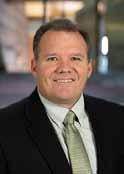
rather than the school board member doing it outside of a board meeting, to ensure compliance with the Freedom of Information Act. Another way to share the information is to have a “legislative update” item on the monthly agenda during the legislative session. Board members could then openly discuss the bills. She urged board members to remain attentive throughout the session. Things typically start slowly and then get very busy.
Garner said in her Region 1 presentation that board members should show appreciation to legislators, who work long hours. Many legislators are very
sue. On the expense side, boards must consider what will help the district reach its goals. Districts have had new expenditures such as internet expenses, additional staff and additional substitute teachers. Because districts have a fixed revenue source, they may need to consider what they’ll do without. Departments and staff may have to be cut, and buildings may have to be closed. Short-term decisions will be needed, but so will long-term decisions to meet parental demand for virtual and hybrid educations.
Another challenge for board members during the pandemic is monitoring and evaluating district leadership. It’s been a challenging calendar year, and
supportive of public schools and of ASBA’s objectives.
She said ASBA staff members spend most of three months at the Capitol and become familiar sights to legislators. But when a lawmaker hears from a school board member from his or her district, it can have a big effect on how he or she votes on a particular bill.
“One call from a board member is probably worth a week of work for the School Boards Association,” she said. “So don’t ever think that you’re just a little person and you can’t do anything helpful for Arkansas education. Nothing could be further from the truth.”
now for superintendents comes the most stressful time: their annual evaluation. Board members should ask what are the superintendent’s stressors and whether he or she needs additional support.
Garner said she receives many phone calls from board members who are sincere in evaluating superintendents. Often, they want to change the evaluation instrument, but this is not the time to do that. Changes should be considered in early spring.
This year, evaluate the superintendent using the instrument he or she was expecting.
“Otherwise your poor superintendent feels like Lucy just snatched the football,” Garner said.



As the first new campus constructed for the Van Buren School District in ten years, Oliver Springs Elementary needed to reflect the needs of a growing community on the north side of Interstate 40. Now finished, this two-story, 60,000-square-foot school houses 450 students and includes modern classrooms, administration space, a gymnasium, performance stage, large lunchroom, and more parking than any other campus in the district. Our team was proud to deliver this landmark project.